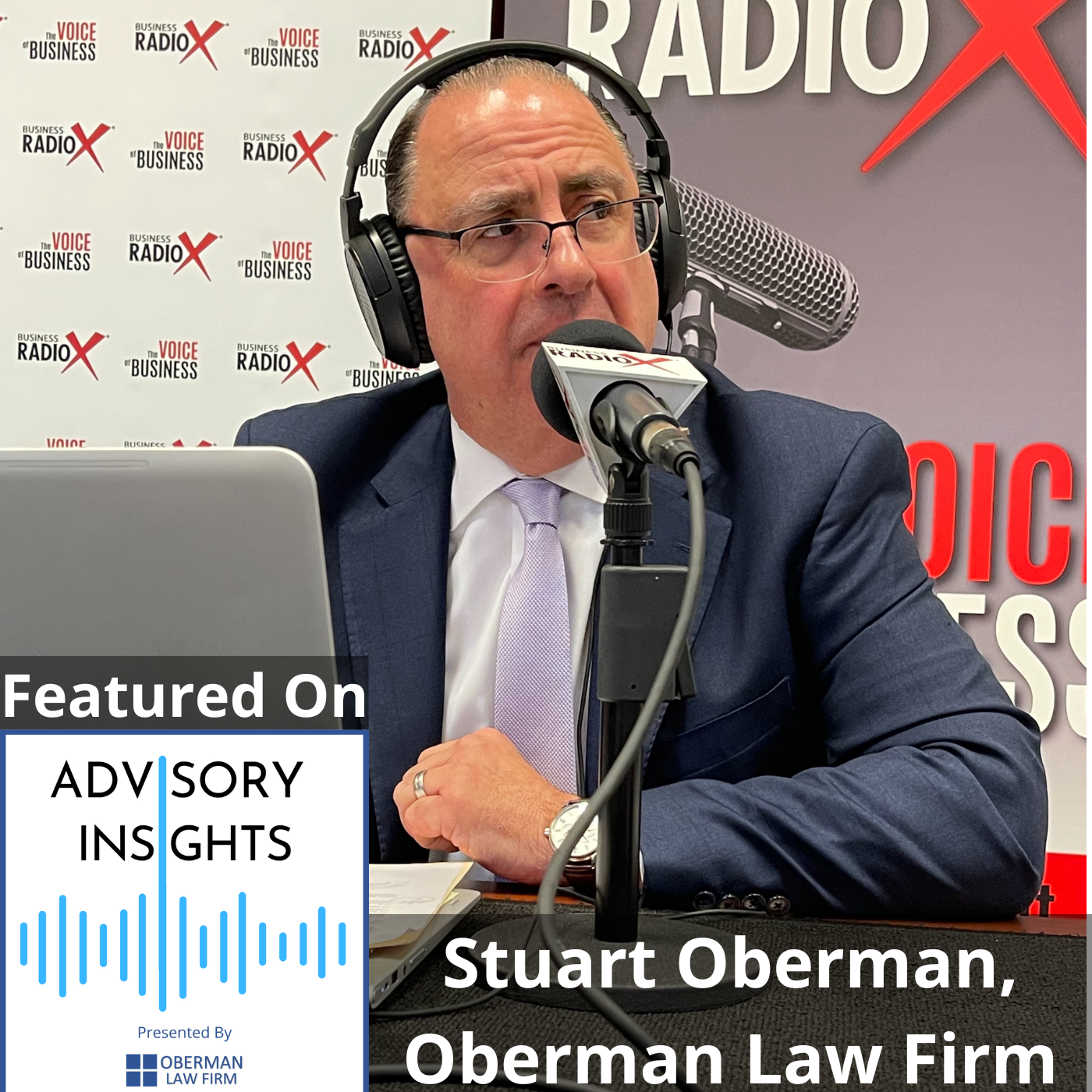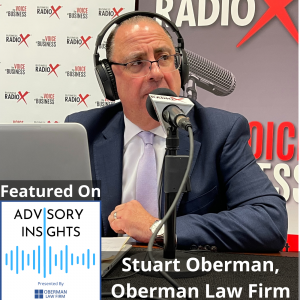

New Federal Protections for Pregnant and Nursing Workers (Advisory Insights Podcast, Episode 33)
On this episode of Advisory Insights, Stuart Oberman of Oberman Law Firm discussed the Pregnant Workers Fairness Act (PWFA) and the PUMP Act, two new pieces of legislation that aim to protect pregnant and nursing workers in the United States. The PWFA requires employers to provide reasonable accommodations to pregnant workers, while the PUMP Act amends the Fair Labor Standards Act to provide protections for nursing mothers during employment.
Advisory Insights is presented by Oberman Law Firm and produced by the North Fulton studio of Business RadioX®. The series can be found on all the major podcast apps. You can find the complete show archive here.
TRANSCRIPT
Intro: [00:00:01] Broadcasting from the Studios of Business RadioX, it’s time for Advisory Insights. Brought to you by Oberman Law Firm, serving clients nationwide with tailored service and exceptional results. Now, here’s your host.
Stuart Oberman: [00:00:20] Hello everyone. Stuart Oberman here, Advisory Insights Podcast. Welcome. Welcome. All right. We’re going to touch base today on some new federal legislation that is geared to protect pregnant workers and nursing workers on the job site.
Stuart Oberman: [00:00:38] So, let’s just briefly take this down a little bit. So, recently, as part of the Federal Omnibus Spending Bill, President Biden recently signed into legislation – I think some great legislation – the Pregnant Workers Fairness Act, which acronym is PWFA, and Providing Urgent Maternal Protections for Nursing Mothers Act, PUMP Act. It’s easier to say the PUMP Act, folks. Expanding federal legislation for the protection of pregnant and nursing workers.
Stuart Oberman: [00:01:19] So, let’s take a look at the PWFA first. So, what does this do? This creates an obligation for employers to grant reasonable accommodations to pregnant workers. This will go into effect in June 2023. So, you got a little bit of time yet. So, this affects 15 or more employers that will be required to provide reasonable accommodations.
Stuart Oberman: [00:01:45] Now, I will tell you this, Federal Law is not the most clear on reasonable accommodations for qualified employees and job applicants with temporary physical or mental limitations due to pregnancy and childbirth related conditions. There’s a lot to that act. I just want to bring that act to everyone’s attention.
Stuart Oberman: [00:02:12] So, for the employees and the applicants that are qualified, without a reasonable accommodation can perform the functions of the current position. So, you got to take a look at what’s reasonable, what’s accommodation, what’s needed. So, with the PWFA, like the Americans with Disabilities Act, it obligates the employers to provide reasonable accommodations. Unless – this is key – unless doing so would impose an undue hardship. Now, that is going to be a business by business, case by case basis. The Federal Law provides a little bit of guidance as undue hardship. But here’s the key, is the PWFA incorporates the ADA, Americans with Disabilities Act, concept on this interaction process.
Stuart Oberman: [00:03:20] So, I think you need to be aware of that if you have 15 or more employees. I think you have to be aware of what the reasonable accommodations are. I think you have to be aware of when it takes effect and what your limitations are.
Stuart Oberman: [00:03:33] Now, I want to jump into Protection for Nursing Moms during employment. So, the PUMP Act essentially amends the Fair Labor Standards Act. What’s right then and there is very broad. So, the acronym FLSA. Again, this is such a broad topic, but I want to bring this to the forefront of top of mind issues. So, it requires employers to provide a reasonable break time – what’s reasonable is an individual basis, I will tell you that – for employees so that they can go ahead and provide breastmilk each time the employee has a need to express such milk during their first year of childbirth.
Stuart Oberman: [00:04:28] So, the employer must provide a place, other than a bathroom, that is shielded from view and free from intrusion of other employees. So, if you’re a small office and you are jammed to the hilt with space, you have no rooms. You’ve got to find a room, folks. If you’ve got an employee that needs to take this kind of action, you have to find a place.
Stuart Oberman: [00:05:08] So, again, this is another key thing, is that the PUMP Act extends to all employees, whether it is exempt and non-exempt. All employees. It doesn’t matter full, part-time. All employees.
Stuart Oberman: [00:05:26] So, I didn’t want to spend too much time on this because, again, this is a whole project in and of itself. But I wanted to make all of our employers aware and our employees aware who are listening regarding the Pregnant Workers Fairness Act and the Protection for Nursing Mothers, the PUMP Act, and how this relates to the Americans with Disabilities Act, how this relates to the Fair Labor Standards Act, and what the accommodations are for expecting mothers and for mothers who are nursing on the job site.
Stuart Oberman: [00:06:00] Folks, that’s all I’m going to provide commentary on this today. Again, it could be a wide range topic, but I just want to bring it top of mind. Folks, thanks for listening to Advisory Insights, Stuart Oberman. If you have any questions, please feel free to give us a call at 770-886-2400 or email, stuart@obermanlaw.com. Folks, thanks for joining us. Have a fantastic day.
Outro: [00:06:26] Thank you for joining us on Advisory Insights. This show is brought to you by Oberman Law Firm, a business-centric law firm representing local, regional, and national clients in a wide range of practice areas, including health care, mergers and acquisitions, corporate transactions, and regulatory compliance.
About Advisory Insights Podcast
Presented by Oberman Law Firm, Advisory Insights Podcast covers legal, business, HR, and other topics of vital concern to healthcare practices and other business owners. This show series can be found here as well as on all the major podcast apps.
Stuart Oberman, Oberman Law Firm

Stuart Oberman is the founder and President of Oberman Law Firm. Mr. Oberman graduated from Urbana University and received his law degree from John Marshall Law School. Mr. Oberman has been practicing law for over 25 years, and before going into private practice, Mr. Oberman was in-house counsel for a Fortune 500 Company. Mr. Oberman is widely regarded as the go-to attorney in the area of Dental Law, which includes DSO formation, corporate business structures, mergers and acquisitions, regulatory compliance, advertising regulations, HIPAA, Compliance, and employment law regulations that affect dental practices.
In addition, Mr. Oberman’s expertise in the healthcare industry includes advising clients in the complex regulatory landscape as it relates to telehealth and telemedicine, including compliance of corporate structures, third-party reimbursement, contract negotiations, technology, health care fraud, and abuse law (Anti-Kickback Statute and the State Law), professional liability risk management, federal and state regulations.
As the long-term care industry evolves, Mr. Oberman has the knowledge and experience to guide clients in the long-term care sector with respect to corporate and regulatory matters, assisted living facilities, continuing care retirement communities (CCRCs). In addition, Mr. Oberman’s practice also focuses on health care facility acquisitions and other changes of ownership, as well as related licensure and Medicare/Medicaid certification matters, CCRC registrations, long-term care/skilled nursing facility management, operating agreements, assisted living licensure matters, and health care joint ventures.
In addition to his expertise in the health care industry, Mr. Oberman has a nationwide practice that focuses on all facets of contractual disputes, including corporate governance, fiduciary duty, trade secrets, unfair competition, covenants not to compete, trademark and copyright infringement, fraud, and deceptive trade practices, and other business-related matters. Mr. Oberman also represents clients throughout the United States in a wide range of practice areas, including mergers & acquisitions, partnership agreements, commercial real estate, entity formation, employment law, commercial leasing, intellectual property, and HIPAA/OSHA compliance.
Mr. Oberman is a national lecturer and has published articles in the U.S. and Canada.
Oberman Law Firm
Oberman Law Firm has a long history of civic service, noted national, regional, and local clients, and stands among the Southeast’s eminent and fast-growing full-service law firms. Oberman Law Firm’s areas of practice include Business Planning, Commercial & Technology Transactions, Corporate, Employment & Labor, Estate Planning, Health Care, Intellectual Property, Litigation, Privacy & Data Security, and Real Estate.
By meeting their client’s goals and becoming a trusted partner and advocate for our clients, their attorneys are recognized as legal go-getters who provide value-added service. Their attorneys understand that in a rapidly changing legal market, clients have new expectations, constantly evolving choices, and operate in an environment of heightened reputational and commercial risk.
Oberman Law Firm’s strength is its ability to solve complex legal problems by collaborating across borders and practice areas.
Connect with Oberman Law Firm:
Company website | LinkedIn | Twitter















